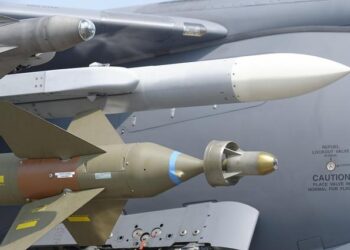In recent weeks, former President Donald TrumpŌĆÖs sudden shift in U.S. foreign policy regarding Ukraine has sparked widespread debate and raised critical questions about the implications for American support for Taiwan. While TrumpŌĆÖs statements have drawn attention for their impact on UkraineŌĆÖs defense against Russian aggression, analysts are now turning their focus to how this realignment may affect Taiwan amid increasing tensions with China. As the geopolitical landscape shifts, the nuances of U.S. foreign policy under Trump’s potential return to power call for a deeper examination of the strategic priorities for both Ukraine and Taiwan. This article will explore the ramifications of Trump’s policy pivot and what it signals for the future of American military and diplomatic commitments in these pivotal regions.
Trumps Policy Shift on Ukraine: Implications for US Foreign Relations
Donald Trump’s recent shift in U.S. policy regarding Ukraine has sent ripples through the international community,raising concerns about the implications for America’s support of Taiwan amidst increasing Chinese aggression. This abrupt change, marked by a potential reduction in military aid to Ukraine, has drawn criticism from foreign relations experts who argue that it undermines U.S. commitments to democratic nations under threat. The geopolitical landscape now raises several questions about how this pivot may affect alliances, particularly in the Indo-Pacific region, where Taiwan stands as a critical focal point against Chinese expansionism.
Key implications of this policy shift include:
- Potential Erosion of NATO Unity: Reduced support for Ukraine may embolden adversaries and create fractures within the transatlantic alliance.
- Increased Pressure on Taiwan: This shift could lead to perceptions of U.S. disengagement, prompting china to adopt a more aggressive posture towards Taiwan.
- Challenges for Future Diplomacy: Reassessing military and economic support may complicate negotiations with adversaries and allies alike.
Furthermore, as the U.S. recalibrates its foreign policy, the impact on international norms surrounding sovereignty and territorial integrity could be profound. The tension between domestic political considerations and global responsibilities has never been more pertinent, suggesting a crucial juncture in U.S.foreign relations.

Analyzing the Impact of TrumpŌĆÖs Stance on Global Security Dynamics
The recent shifts in U.S. foreign policy under Trump’s leadership have stirred significant debate regarding their implications for global security. Critics point out that the U.S.’s inconsistent support towards Ukraine has not onyl emboldened aggressors but may also signal wavering commitments in other critical regions, particularly Asia. This uncertainty raises serious concerns about how allies perceive American reliability in the face of mounting challenges, such as China’s assertiveness over Taiwan. Observers have noted that perceptions of weakness can provoke more aggressive postures from rival states, perhaps destabilizing an already fragile international order.
To further illustrate the shifting dynamics, consider the following potential effects on U.S. allies based on Trump’s approach:
| Region | Potential Effect |
|---|---|
| Ukraine | Increased Russian Aggression |
| Taiwan | Heightened Chinese Military Activity |
| Europe | Erosion of NATO Unity |
| Asia-Pacific | risk of Regional Conflicts |
This gradual shift might lead allies to reevaluate their own security strategies and defense postures. As internal divisions grow and external threats remain persistent, the need for a coordinated response becomes more critical. Understanding the ramifications of U.S. policy changes, especially regarding commitments to aid and military presence, is essential for predicting future global security landscapes.

Taiwans Strategic Position: What Trumps Decisions Mean for asymmetric Warfare
The recent shifts in U.S. foreign policy, particularly concerning aid to Ukraine, raise significant implications for Taiwan’s strategic posture in the face of growing pressures from China. As the geopolitical landscape evolves,Taiwan finds itself at a pivotal crossroads,necessitating a rethink of its defense strategies against potential aggression. The dynamics surrounding American supportŌĆöincluding military assistance and political backingŌĆöwill play a crucial role in determining whether Taiwan adopts a more defensive or aggressive stance in the realm of asymmetric warfare. Key factors influencing Taiwan’s decision-making include:
- US Commitment: The perceived reliability of U.S. support amidst changing political tides can embolden or deter Taiwanese leadership.
- Military Resources: A reassessment of asymmetric tactics, including cyber defense and guerrilla tactics, as viable means to counter a superior foe.
- International Alliances: Strengthening partnerships with regional players and leveraging multilateral frameworks for defense.
Moreover, Taiwan must enhance its asymmetric capabilities while carefully calibrating its responses to Chinese maneuvers. in this context, effective resource allocation and strategic partnerships can increase deterrence, ensuring a robust defense against potential encroachments. This proactive stance could include:
| Asymmetric warfare strategies | Potential Impact |
|---|---|
| Cyber Warfare Enhancements | Disruption of Chinese communications and logistics. |
| Guerrilla Tactics Training | Empowering local defense forces to resist occupation. |
| Intelligence Sharing with Allies | Improved situational awareness for preemptive actions. |

US Allies Assess the Shift: Concerns Over Commitment in Eastern europe and Asia
As the geopolitical landscape evolves, US allies are left grappling with the ramifications of the recent pivot in american foreign policy under the Trump governance.Long-standing commitments to Eastern Europe, particularly regarding UkraineŌĆÖs sovereignty, are now under scrutiny. Partners in NATO are increasingly focused on whether the United States remains a reliable ally in deterring Russian aggression. Concerns mount that an inconsistent approach might embolden adversaries and destabilize an already fragile region. In the wake of this shifting policy, Eastern European nations worry about the long-term security guarantees once assumed to be a cornerstone of US involvement.
Together, the uncertainty in AmericaŌĆÖs stance towards Ukraine casts a long shadow over Taiwan, where the threat from China looms large.Regional leaders in Asia are acutely aware that the perception of US commitment is essential for maintaining a balance of power. They fear that a diminished US resolve could embolden Chinese assertiveness in the Indo-Pacific.Key stakeholders are considering the implications of a wavering US commitment, leading to discussions around choice security collaborations and strengthening regional partnerships. These dialogues have sparked a renewed emphasis on both military readiness and diplomatic engagements aimed at reinforcing alliances across both continents. Key concerns include:
- Reliability of US military support
- Impact on collective defense initiatives
- Potential shifts in regional power dynamics
Amid these discussions, a comparison table highlights the contrasting responses of both regions regarding US policy changes:
| region | Primary Concern | Potential Responses |
|---|---|---|
| Eastern Europe | Russian Aggression | Strengthening NATO presence |
| asia | Chinese Expansionism | Enhancing regional cooperation |

Recommendations for a Coherent US Foreign Policy Approach Moving Forward
As the geopolitical landscape evolves,the United States must adopt a strategic and unified foreign policy framework that addresses current challenges,such as the situations in Ukraine and Taiwan. To achieve this, the U.S. should emphasize a multidimensional approach that includes:
- Diplomatic Engagement: Strengthening alliances and fostering dialog channels with partners in Europe and asia.
- Military Preparedness: Ensuring that military readiness is prioritized while making clear commitments to allies.
- Economic Support: Providing economic assistance to nations under threat to bolster their resilience against aggression.
Moreover, the integration of consistent messaging and policy alignment is vital for reinforcing credibility on the global stage. This includes maintaining a clear stance on territorial integrity and sovereignty. Considerations for the future should involve:
| Focus area | Action Item |
|---|---|
| Collective defense | Enhance NATO partnerships and extend defense commitments in Asia. |
| Humanitarian Aid | Increase support for displaced populations affected by conflicts in both regions. |
| Trade Relations | Boost trade agreements with key partners to strengthen economic ties and deter aggressors. |

The Future of US-Taiwan Relations Amidst Changing Political Landscapes
the recent shifts in U.S. foreign policy, particularly concerning Ukraine, have sparked apprehension regarding the future stance on Taiwan. As the political landscape evolves, itŌĆÖs essential to analyze how these changes might influence U.S.-Taiwan relations. The abrupt pivot suggested by former President Trump’s approach to Ukraine indicates an unpredictable trajectory, raising concerns that similar fluctuations could jeopardize the longstanding commitment to Taiwan’s defense. Observers warn that a lack of sustained support could embolden adversarial actions from China, thereby destabilizing the region further.
In assessing the implications of these developments, several key factors should be considered:
- Strategic Partnerships: The U.S. must reinforce its alliances in Asia to counteract increasing Chinese influence.
- Military Cooperation: Continued arms sales and joint exercises with Taiwan are vital for deterrence.
- Economic Ties: Strengthening trade relations and technological collaboration will bolster Taiwan’s position on the global stage.
The following table outlines potential U.S.policy scenarios regarding Taiwan in the wake of changing political dynamics:
| Scenario | Potential outcome |
|---|---|
| Increased Defense Support | Stronger deterrence against Chinese aggression |
| Reduced Engagement | Heightened risk of Chinese assertiveness |
| Economic Sanctions on China | Potential backlash impacting global markets |
| Enhanced Multilateral Alliances | Improved regional security cooperation |

In Summary
the recent shift in U.S. policy regarding Ukraine under the Trump administration has raised significant concerns about the future of american support for Taiwan. As geopolitical tensions continue to escalate in both Eastern Europe and Asia, the implications of such a policy change could reverberate through international relations, affecting not only defense strategies but also the broader balance of power in the region. Observers and analysts will be closely monitoring how this decision impacts U.S.commitments to its allies and partners,as well as the potential for regional instability. As the situation evolves, the need for clear and consistent policy remains paramount, particularly as global threats become more interconnected. The coming months will be crucial in determining the trajectory of both U.S. foreign policy and the security landscape in Eastern Europe and the Indo-Pacific.










![Azerbaijan reaffirms support for SomaliaŌĆÖs sovereignty at OIC emergency meeting [PHOTOS] – AzerNews](https://europ.info/wp-content/uploads/2026/01/3037165-azerbaijan-reaffirms-support-for-somalias-sovereignty-at-oic-emergency-meeting-photos-azernews-120x86.jpg)





